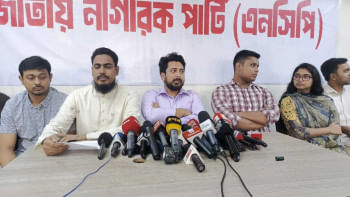Revisiting the Revolution
For this generation, younger and older alike, are so far removed from the days of 1971, it is all too easy to undermine the struggle that was synonymous with our independence. In a period of political turmoil, farcical democracy and insecurity, the elation that freedom generates has steadily become tinged with a feeling of exasperation.
Yesterday's heroes have been unceremoniously tugged from their pedestals and stored away in dusty corners of our minds.
What was it all for, many wonder. Perhaps a trip down to the abode of Jahanara Imam, can help remind us of what we may be beginning to forget.
Shaheed Jahanara Imam Memorial Museum, located at Jahanara Imam's home, Kanika, on 35 Dhanmondi (Old Elephant Road), Dhaka, like the spirit of '71, remains today, standing the test of time.
The picturesque dwelling, with its rustic glory restored, acts as a portal to different times. Kanika appears frozen in time, clinging on to a past increasingly fading from collective memory.
The entrance greets the visitors with walls adorned with numerous letters, photographs and pictures. Up ahead lies the bed room, furnished with her actual bed, with her spectacles, numerous cheque books and more photographs lying around. This area is where Jahanara Imam sat to write down her feelings on the war in her dairy. That dairy would go on to become the widely read “Ekkatorrer Dingulee.” Surrounded by such rich history, tainted with tragedy, one can almost hear the writer's pen scratch lines against her dairy. This is literally where history was written.
Jahanara Imam, raised in a liberal and open minded family, completed her schooling in Carmichael College in Rangpur. From there, she was off to Lady Brabourne College in the University of Calcutta. It was here where her activists' ways came to the fore.
After the partition of India, Jahanara Imam came to Dhaka in 1948, got married and opted for the headmistress' job in Siddheshwari Girl's School. Under her guidance, the school went from being modest to becoming one of the best girls' school in the country.
Historians revert back to her upbringing; Jahanara's mother ensured the best education for her daughter despite a period when such notions were considered foolhardy. Jahanara thus carried the torch and had the same determination to provide the best education for the next generation of women.
Unknowingly, Jahanara Imam blazed a path of feminism, soon becoming the editor of the woman's magazine, “Khawateen”. She then attended Dhaka University in 1962, earning a Master's Degree in Bengali Language and Literature. In 1964-65, she attended San Diego University, going as a prestigious Fulbright Scholar.
Jahanara Imam, like so many millions, had no inkling of the tragedy that was yet to come. When the war for Independence broke out in 1971, Jahanara Imam, although caught in the crossfire, refused to lay down silently.
In a letter present in the museum, she urges her elder son to join the Mukti Bahani and sacrifice his life for the country if need be. Although written as a doting mother, Jahanara Imam retained her fiery spirit, embracing the ultimate sacrifice and urging her son, Shafi Imam Rumi, to do the same.
Shafi went on to serve the Mukti Bahini well, but was eventually captured by the Pakistani army. After not having heard from her son in a number of days, Jahanara Imam wrote letters to numerous hospitals and thanas in the area looking for her son. These letters along with some of the replies she received have also been preserved at Kanika.
Apart from her literary achievements, the museum also displays photographs and writings which led to the formation of the Ghatak Dalal Nirmul Committee, an organisation she headed which demanded swift justice and punishment for those who caused the atrocities in 1971. The organisation helped seal Jahanara Imam's legacy. She went on to become an outspoken activist and well-loved author, penning often thought-provoking and insightful pieces.
Amongst the many freedom fighters and the revolutionaries of yesteryears, Jahanara Imam has left behind a lasting legacy. She remains an inspiration for many and continues to play a vital part in the upbringing of this nation and nurturing future minds.
Jahanara Imam's role along with the struggle that went towards our independence is one that should not be forgotten. And the four walls of her home whisper just those words. You only have to listen closely to remember that which we are steadily forgetting.

 For all latest news, follow The Daily Star's Google News channel.
For all latest news, follow The Daily Star's Google News channel. 



Comments